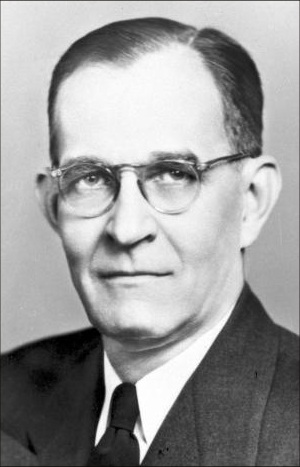Publisher's note: We believe the subject of history makes people (i.e., American people) smarter, so in our quest to educate others, we will provide excerpts from the North Carolina History Project, an online publication of the John Locke Foundation. This one hundred and thirteenth installment was originally posted, by Adrienne Dunn, in the North Carolina History Project.
Governor Umstead (pictured here) allowed the "Governor's Special Advisory Committee on Education" to respond to the Brown decision. Image courtesy of the State Department of Archives and History, Raleigh, North Carolina.
The United States Supreme Court's ruling in the Brown v Board of Education (1954) declared racial segregation in public schools unconstitutional. Following the Brown ruling, North Carolina enacted legislation that undermined the Supreme Court ruling.
In August 1954 and in response to the Brown decision,
Governor William B. Umstead created a "Governor's Special Advisory Committee on Education," with Thomas Pearsall, a prominent Rocky Mount farmer and businessman and former North Carolina Speaker of the House, as chairman. Along with Pearsall, the advisory committee included twelve whites and three blacks. The Committee concluded that integration in the public schools could not be accomplished nor should it be attempted. Trying to delay desegregation, the committee proposed giving local districts control over the assignment of students to particular schools. As a consequence, in the spring of 1955, the General Assembly enacted the Pupil Assignment Act. It used race-neutral criteria to block option for Africa American to transfer to white schools.
After Governor Umstead's untimely death, Governor Luther H. Hodges continued to stall desegregation. Governor Hodges created a new committee that became known as the Pearsall Committee. Chaired by Pearsall, the seven-member committee included no African Americans. At the conclusion of several meetings, conferences, and hearings, the committee recommended a state constitutional amendment that empowered the General Assembly to enact legislation circumventing integration. The legislation proposed by the committee, which became the Pearsall Plan, amended the Compulsory School Attendance Law so that students might be excused from attending an integrated public school. The Plan also recommended that the state consider special applications requesting state to pay private school tuition grants to parents whose children were assigned to the integrated public schools. During a special session of the General Assembly in July 1956, legislators adopted the Pearsall Plan with only two dissenting votes, yet needed the public's opinion for the bill to become law. Many African American leaders and some whites argued that the Pearsall Plan violated Brown, and others criticized the Plan because they claimed it threatened public schools by relinquishing power to local school boards. In the end, North Carolinians voted five to one to uphold racial segregation in the state's public schools.
Although the 1964 Federal Civil Rights Act, which contained a provision prohibiting discrimination in public education, declared the Pearsall Plan unconstitutional in 1966, token integration and residential segregation allowed the Pearsall Plan to continue. Finally, the case of Godwin v. Johnston County Board of Education (1969) ruled the Pearsall Plan unconstitutional.
Sources:
Lindley S. Butler and Alan D. Watson. The North Carolina Experience.: An Interpretive & Documentary History (Chapel Hill, 1984).; Jeffrey J. Crow, Paul D. Escott, and Flora J. Hatley. A History of African Americans in North Carolina (Raleigh, 2002); William S. Powell ed. Encyclopedia of North Carolina (Chapel Hill, 2006). North Carolina Board of Education. Electronic access: http://www.ncpublicschools.org/stateboard/about/history/chapters/three (accessed July 28, 2009).

























